How Access to Work and Brain in Hand help me thrive at work
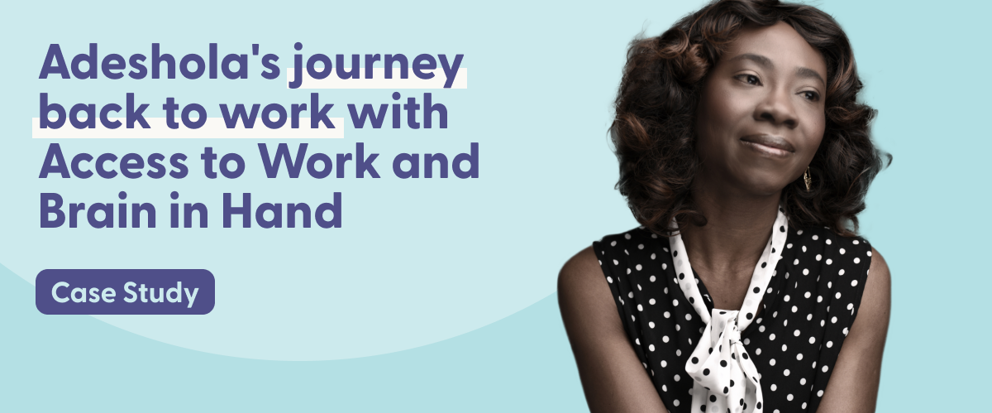
“I didn’t have enough support at work to help me manage my day-to-day,” says Adeshola, reflecting on her experience before receiving Access to Work support. “Because of health conditions, I had to go on long term health and sickness absence.”
Meet Adeshola Akanji, a biomedical science graduate from London Metropolitan University with 16 years of NHS experience. She identifies as neurodivergent, and has a number of long-term health conditions and disabilities that affect her mentally and physically.
Adeshola currently works as an Outpatient Transformation and Efficiency Project Manager for the Barts Health NHS Trust at Royal London Hospital. She is the co-chair for the Disability Network within her organisation, a wellbeing champion and an inclusion ambassador. Her role involves ensuring equitable recruitment and interview processes.
As an Access to Work applicant and Brain in Hand user, Adeshola shares her personal journey with us. She talks about returning to work as her best self, how Brain in Hand supports her at work, and shares how organisations can embrace Access to Work.
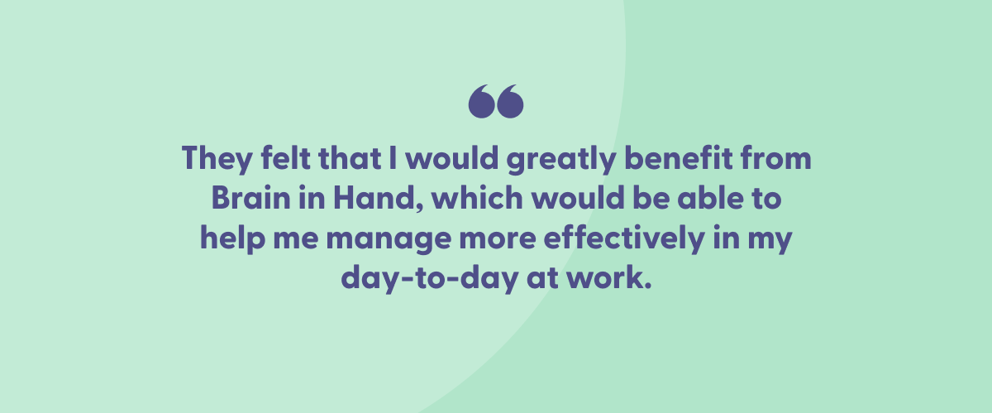
Discovering Access to Work
“At the time, I was on sick leave and I tried to find the sources of support to enable me to be able to go back to work and make things a bit easier for me.” shared Adeshola. “In my journey of research and trying to find the right resources to support me, I discovered Access to Work by chance.”
After her Access to Work assessment, Adeshola was provided with a range of support. This included a sit and stand desk, noise cancelling headset, and software, which included Brain in Hand. “I was also able to get a travel to work grant as well as part of the resources and support that I needed to help me work.”
Adeshola shares how she benefits from Brain in Hand’s combination of on-going human support and practical digital tools. She found Brain in Hand helped her to:
Manage overwhelming situations: “The ‘unplanned events’ section as well was very useful because it helped me to be able to manage when I have an overwhelming situation that I’m not sure how to manage.” she explains.
“I could go to look at things when I’m overwhelmed,” says Adeshola, highlighting how Brain in Hand helps her manage at work. “For example, if I’m anxious about things, about attending a meeting - I can look at what I can do to help me, even just going for a walk and taking a break from my desk.”
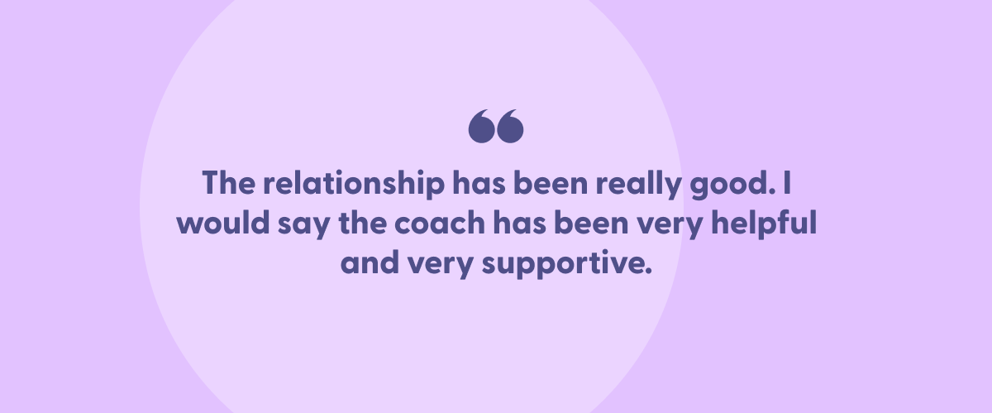
Remember useful coping strategies: “I can always reflect back and look at, you know, things that have helped me before,” she says, expressing how easy it is to forget the little things when feeling overwhelmed. “Especially when you are neurodivergent, sometimes you don’t think of those little things. I get brain fog and can’t think at that point in time.
Develop action plans with a coach: “The relationship has been really good. I would say the coach has been very helpful and very supportive. I was finding it quite difficult to think of ideas to put in for the ‘unplanned events’ part of Brain in Hand.” shares Adeshola, highlighting how she’s able to benefit from a combination of human support and digital tools.
“And working with a coach has really benefited me because if things aren’t coming to mind at the time - we can talk together and come up with a plan together. We’ve been able to do that and come up with ideas and solutions that can help me.” says Adeshola, and she further explains that she can now “go forward and think and discuss with other people within my network as the co-chair of the disability network and see what’s helped them” to add more ideas and solutions to her unplanned events in Brain in Hand.
Track and manage her moods: “And what I also found very useful is the traffic lights. And the traffic light is quite beneficial because it helps me manage my moods as well to see if, I’m you know, my mood is fine, if I’m in a you know, a low mood or anxious.” she explains. By using the traffic light system, she was able to identify when she needed support, and when to take action.
“I could use that to get support and someone can just remind me of things that you know what, you’ve used this in the past. This can benefit you to help you manage and defuse the situation. And it was able to help me at work to manage my ever conflicting schedules as well.” says Adeshola, sharing how she was able to access support by using the traffic light system.
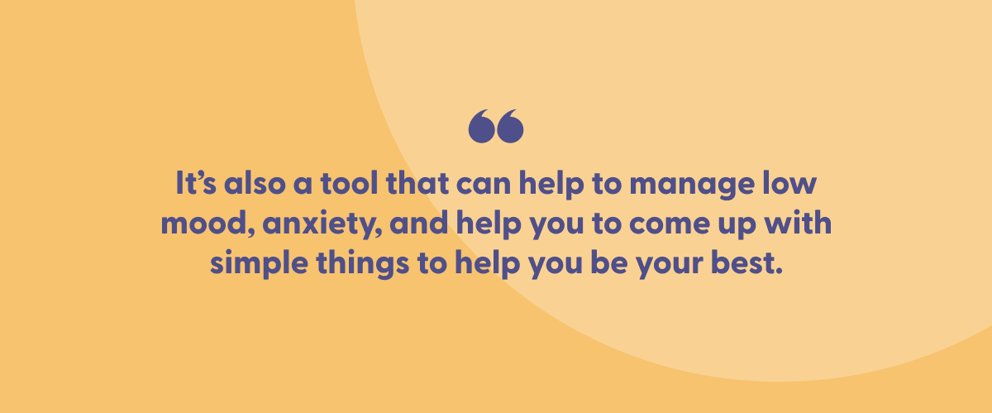
How Brain in Hand can support neurodivergent adults
Adeshola shares what Brain in Hand is to her and how she would describe the tool to others. She explains it is a tool that can be useful for:
-
Managing time and overwhelm: “I would describe it as a very useful tool. A very important tool that is very beneficial for managing schedules for people that can find it quite overwhelming.”
-
Mood management and coping: “It’s also a tool that can help to manage low mood, anxiety, and help you to come up with simple things to help you be your best.”
-
Staying organised: “It’s also a very useful tool that can help you to do things in a more organised fashion. Once you have them, you know the schedules, the plans, you get more organised. So it’s helped me to be much more organised in the way that I plan my day, in the way that I apply useful tools in my day-to-day life.”
Overall, she says “This is a tool that I know they will benefit from to help them manage their day-to-day, especially when they’re going through anxiety or they’re neurodivergent.” and has expressed that Brain in Hand allows her to thrive at work, “That’s what it’s done for me - to help me be my best at work.”
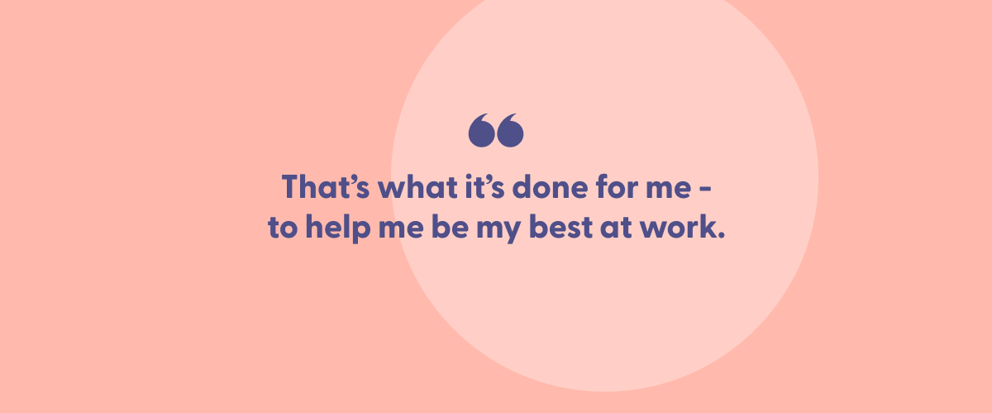
How organisations can embrace Access to Work
Access to Work has been key in helping Adeshola return to work as her best self with the right support. We asked her how organisations can bridge the gap between their employees and Access to Work.
Understand Access to Work
“I think it’s important for them first of all to have the knowledge themselves of the Access to Work process. What I find is that a lot of managers don’t have an understanding of the Access to Work process to be able to support their staff members.” says Adeshola.
She explains how her organisation supported their staff to learn more about the scheme. “One of the things we did as part of our neurodiversity week was to bring in Access to Work, to come to speak at our event, to talk people through.” she says, and explains some of the common misconceptions staff might have.
“Especially, the time frame is an important factor with Access to Work - it doesn’t happen automatically or straight away. There is a waiting time for that and helping people to understand that. But at the same time, helping people to understand that while they are waiting for the Access to Work, they can put temporary things in place as well for staff members within that period of time.”
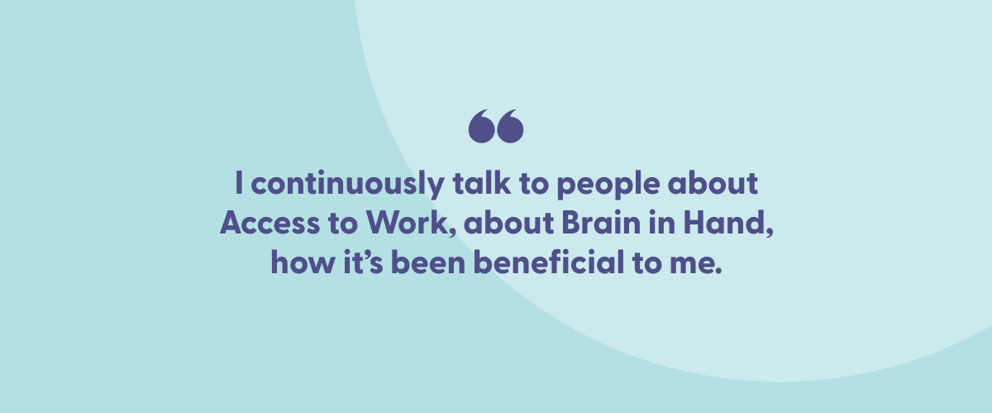
Signpost and support staff to Access to Work
“Secondly, being able to signpost staff members to Access to Work for support. I know a lot of managers are worried about how they can ensure staff members get the reasonable adjustments they need. But at the same time, they don’t know how to go about it.” she explains, highlighting the barriers that arise in the workplace, “So, I will say knowledge is key, for them as well to gain the knowledge, to be able to sign post their staff members to Access to Work, to understand how the Access to Work process really works. So that they have realistic expectations.”
When staff do receive recommendations, she explains that putting these into place is highly important. “At the end of the day, ensuring that once staff members have the recommendations from Access to Work, ensuring that these are taken very seriously and dealt with as soon as possible. To ensure that the recommendation is put in place as soon as possible for those staff members.”
Adeshola’s advice
“It’s important to do research. For people, it’s very important, especially when you have long-term health conditions, or disability. Either physical disability or hidden disability. It’s always important to do research on the support. That’s how I was able to find out about Access to Work.” says Adeshola, offering her insights into how everyone can seek the support they need, if the right support is not already in place.
As someone who champions neuroinclusion, she also expresses how important raising awareness can be. “I continuously talk to people about Access to Work, about Brain in Hand, how it’s been beneficial to me. Sometimes, through word of mouth, people can also find out more about things that can benefit them. That’s why it’s important to raise awareness and to share with other people what’s benefitted us. So that they can look at how it can benefit them as well.”
“What I continue to do is aspire to make sure that everyone feels that they can bring their best self to work. They can have all the right resources and tools to help them be their best at work.”
